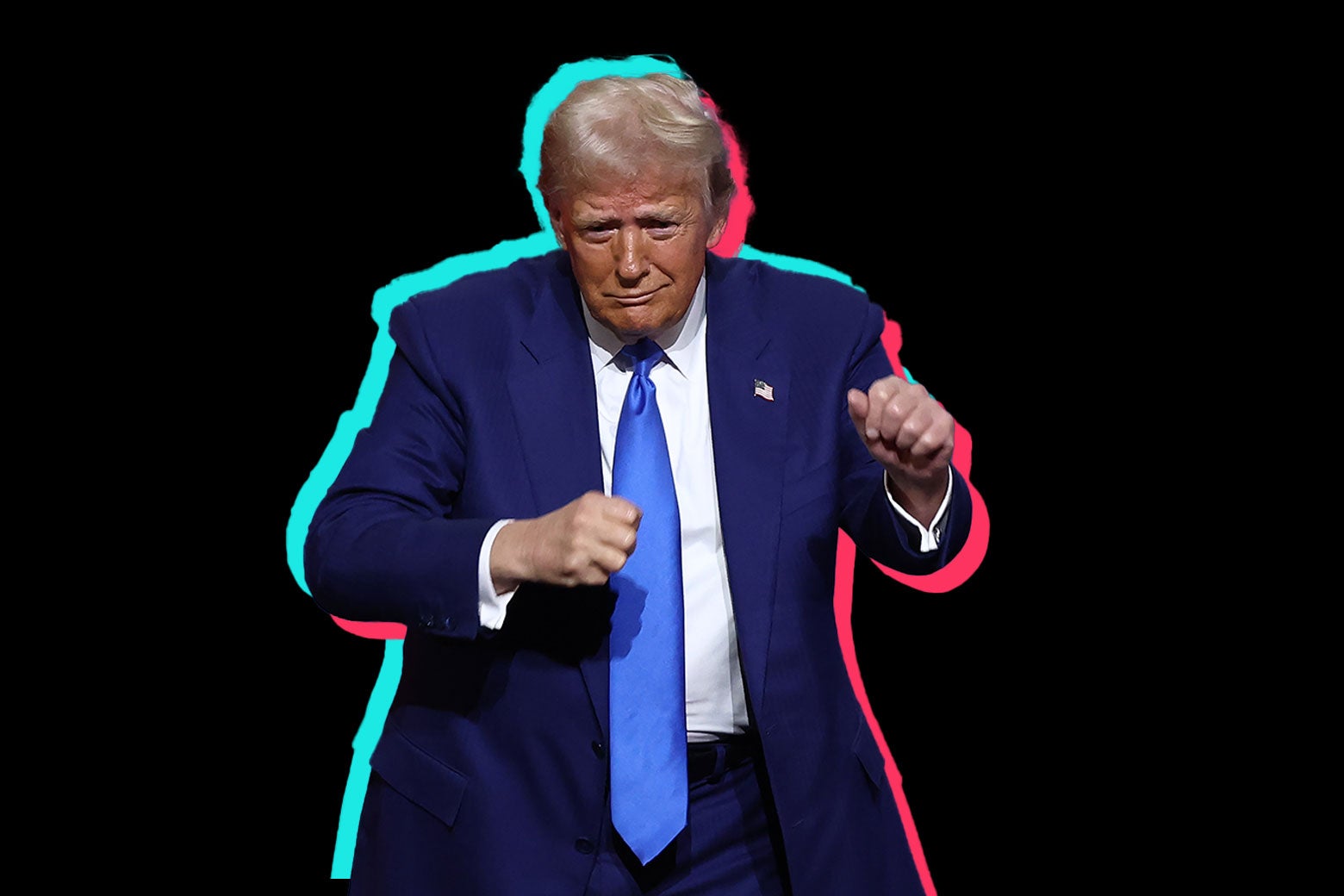Trump spearheaded the charge to ban the app—now he might come to its rescue.

Sign up for the Slatest to get the most insightful analysis, criticism, and advice out there, delivered to your inbox daily.
TikTok’s future in the United States is as shaky as it’s ever been—and its political fate may come down to Donald Trump, the man who originally tried to ban it years ago.
Earlier this year, Congress passed a law banning TikTok in the United States unless its parent company, ByteDance, divests from the app—though lawmakers like Sen. Richard Blumenthal insist it’s not a ban but rather a “forced transition of ownership.” This was the culmination of a yearslong effort initiated by Donald Trump in 2020 when he unsuccessfully tried to ban the app through executive order until a federal judge stopped him and said he was likely exceeding his authority under the law.
So, why the hate? As TikTok has become an überpopular social platform as well as a cultural tour de force in the United States, its Chinese provenance has made it a political lightning rod on both sides of the political aisle. Anti-TikTok crusaders in government have claimed without evidence that TikTok’s presence on American cellphones is a pressing national security threat because of data security and propaganda concerns that outweigh the free speech rights of the 170 million Americans who use the app to communicate.
TikTok sued the U.S. government in May claiming the law violates the First Amendment, which guarantees free speech, and constitutes an illegal “bill of attainder” that punishes a party without trial and due process, among other claims. But on Dec. 6, three judges on a federal appeals court in D.C. upheld the law, saying the law was “carefully crafted to deal with only control by a foreign adversary,” and didn’t violate the First Amendment. Attorney General Merrick Garland celebrated the decision, calling it “an important step in blocking the Chinese government from weaponizing TikTok to collect sensitive information about millions of Americans, to covertly manipulate the content delivered to American audiences, and to undermine our national security.”
On Dec. 9, TikTok filed an emergency injunction that would temporarily block the ban from taking effect until the Supreme Court can weigh in on its constitutionality. Since the law is set to take effect on Jan. 19, the day before Trump’s inauguration, it would also give the incoming president time to take action to save TikTok—something he’s suggested he might do.
Let’s get one thing straight: Banning TikTok would be an affront to the rich tradition and legal protection of free speech in the United States. Never before has the U.S. government blocked access to such an important and well-trodden medium for speech—including political speech—in this country’s history. The ban, if it takes effect, would stomp on the free speech rights of hundreds of millions of Americans in the wake of one of the most important elections in history. While TikTok’s Chinese origins might be unsettling, the Supreme Court has long enshrined our constitutional right to receive foreign media—even if it’s propaganda from foreign adversaries.
ByteDance’s ability to capture Americans’ lip-synch video viewing habits or their basic demographic information, or even to push or moderate content in unfavorable ways, does not negate the right that we—as Americans—have to that information. Jameel Jaffer, executive director of the Knight First Amendment Institute at Columbia University, put it best in response to the appeals court’s decision: “This is a deeply misguided ruling that reads important First Amendment precedents too narrowly and gives the government sweeping power to restrict Americans’ access to information, ideas, and media from abroad.”
Donald Trump once piloted a ban of TikTok, but has since flip-flopped on the issue because one of his biggest donors, Jeffrey Yass, is a major investor in the app. (No one has accused Trump of being a man of principle.) Trump said in a September post on Truth Social that he would “save TikTok” if elected—though that might have been a late-game appeal to young voters.
But how would that actually work? Former Justice Department national security adviser Alan Rozenshtein told the Washington Post that Trump had three main options: 1) He could persuade Congress to repeal the law; 2) He could direct his new attorney general not to enforce it; and 3) He could declare that ByteDance is in compliance by satisfying the requirements of the law by performing a “qualified divestiture.”
Option No. 2 seems easiest: The technical prospect of actually banning TikTok is murky—the mechanism appears to be in penalizing mobile app marketplaces such as Apple’s App Store and the Google Play store if they allow downloads of the app, or even cloud companies for hosting TikTok’s data. The app won’t disappear from users’ phones, but might degrade and become laggy over time if users cannot download updates. (Yes, ironically, this makes the security of the app much, much worse, but don’t tell Congress that.)
Trump’s Cabinet is openly hostile to TikTok. Brendan Carr, Trump’s pick for Federal Communications Commission chair, has supported a total ban of the app, while Sen. Marco Rubio, Trump’s nominee for Secretary of State called the ban a “win for America” last year. But Donald Trump’s loyalties are famously reserved for Trump’s own whims—not the ideological preferences of his advisers.
In that standard Trump flip-flopping nonsense, there might be hope that Trump does the right thing even if it’s for the wrong reason. With a wave of a hand, Trump can cancel out the damage he did by starting this mess years ago, and become an unlikely savior for free speech in America. And that’s something I never thought I’d write.
Get the best of news and politics
Sign up for Slate’s evening newsletter.
Discover more from CaveNews Times
Subscribe to get the latest posts sent to your email.
























![Exploring the Serene Beauty of Nature: A Reflection on [YouTube video title]](https://cavemangardens.art/storage/2024/04/114803-exploring-the-serene-beauty-of-nature-a-reflection-on-youtube-video-title-360x180.jpg)























